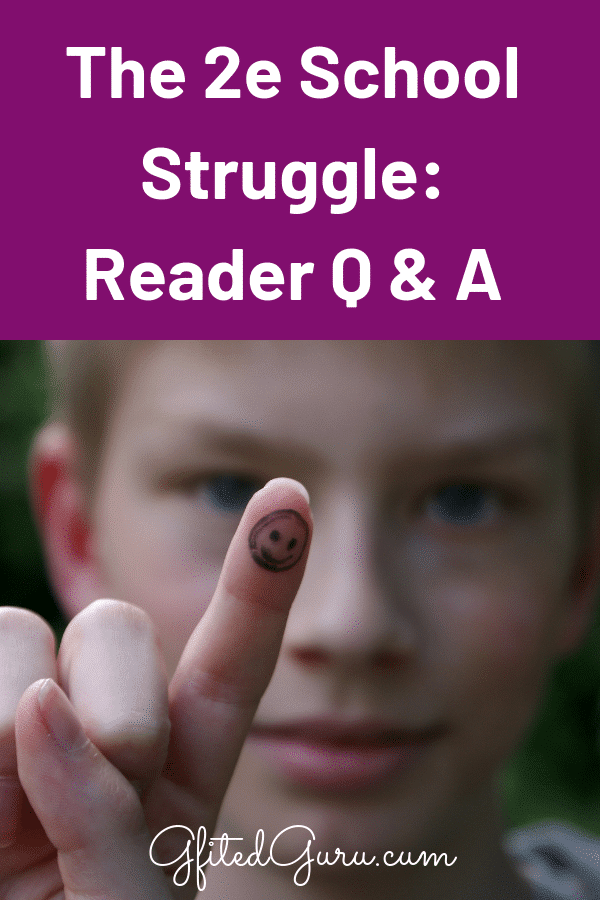When a student is struggling in school, a family is struggling in school. I once heard Dr. Phil say, “When you’re a parent, you’re only as happy as your saddest child.” #truth
I frequently hear stories of school struggle from readers.
Sometimes the stories just break my heart. Sometimes they stump me. Sometimes I feel like there’s an entire other story I’m not hearing that makes a quality response difficult, and sometimes I know I need to call in the big guns: my therapist best friend Patricia Bear.
The letter I received recently from a parent fell into that last camp. There is so much pain, so much concern, so much love in this letter that I didn’t want to get it wrong.
I’ve got Patti’s response below the letter, and then my thoughts below Patti’s.
That makes it perhaps the longest article on this entire site except for the ones I’ve published in magazines, so good luck with the reading endurance!
I actually think it’s an important article, so I hope you’ll stick it out.
Note: Frequently I get questions from parents or teachers about their children and students. It’s frustrated me that I don’t have time to write back to everyone, and so I’ve decided to begin a “Reader Q & A” feature on the site. You can find all responses here.
If you have a question about your child, your student, best practices, or anything Giftedesque, shoot me an email or comment below, and we’ll see what we can do!
School Struggles from a Parent’s Perspective
The parent writes:
I loved the article My Gifted Anti-Bucket List, but it also greatly depressed my husband and I because my son’s school and teachers checked off 1, 2, 5, 6, and 7 on your list.
My son is a remarkable, funny, caring, wonderful 7-year-old who is also gifted (genius level in nonverbal intelligence) with Autism Spectrum Disorder, ADHD-combine type, General Anxiety Disorder, and Sensory Processing disorder.
He has an IEP that only addresses his difficulties, despite many ARD meetings and bringing in an advocate. We fought for the last year to get him into his school’s gifted program and he finally qualified despite the roadblocks they put up against him. Now they have to take him per our district’s policy.
His gen ed teacher refuses to differentiate his education in anyway, saying that until he does the other classroom work she can’t give him anything else. He refuses to do it because it’s so far below his level and/or because his disabilities make complex, multi-step assignments a nightmare for him.
She gave him “challenge worksheets” for a month or two at the beginning of the year. It was given to him as an option instead of doing the easier work, but he was never given any instructions on how to do it.
She writes about his poor writing skills but has come up with no way to help him improve them.
The school’s idea of helping is to make the assignments shorter instead of figuring out why he is struggling to get the work done on subjects he could answer all the questions verbally on.
She won’t listen to my suggestions because she “doesn’t have the time to do that because there are 20 other children in her classroom.”
My son has a second teacher just for him most of the day. They have now pulled him out of gen ed for all independent work because he supposedly can’t deal with the distractions.
However, I have also been told that he can’t handle a small group setting, and can’t focus with one-on-one instruction either. In other words, they can’t educate my son.
He’s too tired to do much enrichment after school with me. On bad days, they send an entire day’s worth of classroom work home, so there is no time to do anything else.
It’s stuff he’s been doing since he was 3 or 4 years old, so I understand why he refuses to do it. He has learned 2 things this entire academic year; how to tell time to the half hour and the value of coins for US currency.
The other skills he has gained have been things we work on at home. The academic skills he had years ago he has lost due to lack of practice.
They say that until they can get his behaviors under control he can’t be in the minimal gifted program the school even offers, that he will have to receive services a different way.
That different way is lesser than other children receive. I should note these behaviors are school related only, if they happen to come home it’s because they spilled over from school.
He has too many struggles for a private school for gifted children, he’s too high functioning for a special needs school, and both my husband and I have to work, so homeschooling is not an option.
I sob at least once a week from sheer frustration on how to get him the help he needs at school. They won’t let us come in to observe the classroom as parents to give suggestions. They won’t let his therapists come in either. They won’t provide a behavioral aide that could help him with EF skills and anxiety.
They have talked about putting him into a self-contained classroom at a different school, which if you spoke to my son for more than 30 seconds, you would realize would be an entirely inappropriate setting given his verbal and cogitative abilities.
He’s miserable in school. It’s making our family life terrible. No amount of advocating seems to have any impact. The more I advocate, the more resistant the school becomes.
We would move, but where? We have so many complex things like doctors and therapists nearby and grandparents we’re taking care of without any help from family that lives 1,300 miles away.
My son finally has friends in school and he’s made such amazing social skills strides. We feel like it would completely crush him if he had to start all over again in a new home, city, school, etc.
I feel like we’re doing everything we can. We’ve been told we’re doing what we should be doing, but it never feels like enough.
Anytime we help him address his struggles and finally get things working good at home, we then send him to school where it all goes down the drain.
I feel like there is no support system for any of this. It’s all so overwhelming.
I’m terrified for his future. I have prepaid for his college education and set-up a special needs trust fund in case he can never function on his own. It’s a horrible, and expensive, duality no family should ever have to deal with.
I would love any advice on how make things better at school. I’m at my wits end.
The Therapist Speaks
Patti’s response:
I feel sad whenever I hear about such a young child already having this many diagnoses.
I question whether they can all be true, but I’ll take it at face value and say that if this kid is having this many struggles at his age I completely understand why school is so difficult for him, his parents, his teachers, and other staff at the school.
In situations like this I recommend focusing on one thing at a time, and it seems like the thing to focus on first in this case is socialization and friendship.
If he is making friends I would help him focus on that both at school and at home, and increase his opportunities to play with his friends. I would also focus on helping him find reasons to behave well at school even when he is bored, underchallenged, etc., so that he can get along with people and feel better about himself in interactions with others.
Let’s face it, no matter how old you are, nobody cares how much you know or how well you can do it if they just don’t like you. A kid like this needs to cultivate as many people as possible just liking him.
Cheri Huber said, “The alternate reality in which everything is exactly as you think it should be exists only in your mind, and it exists primarily to torture you.”
I emphasize the last part – these parents are being tortured by their ideas of how things ought to be.
It’s not that I disagree with them: I would love it if we lived in a world where everyone got all their needs met and were treated with the universal dignity we all deserve.
BUT WE DON’T, and trying to make it so increases our distress rather than decreasing it.
I encourage mom and dad to get their own therapy to help them reconcile their own anxieties and grief over having a son that is not what any parent anticipates when imagining what it will be like to have a child.
It’s clear they love him abundantly. Love does not preclude grief, loss, disappointment, fear, worry, etc.
In fact, the more we love someone, the more likely we are to have those strong feelings.
The other thing mom and dad probably need to address is their own experiences of giftedness and how that impacted them as children and continues to impact them.
I’m going out on a limb here, but I’ve seen many of these trees!
I imagine that they’ve had many experiences similar to their son’s and that their frustrations for him are compounded by their frustrations for themselves.
The Teacher Speaks
In this case, it’s not the child’s teacher: it’s me. I’m going to put on my teacher hat to respond here, with the caveat that I have never met the child, the parents, or the teacher, so take it all with a handful of grains of salt.
First, teachers do not go into teaching to make kids’ lives miserable. When a student is miserable, the teacher is miserable, too. I know this from teaching thousands of students. We want students happy and well-served in school.
The same is true of schools. There’s not one person working in a school who couldn’t make more money for less work in another occupation. They’re there because of deep passion and commitment to growing kids.
It’s important to know and believe that because it changes the paradigm.
Assume this is true, and ask: If I accept that the teacher truly wants what’s best for his/her students, what barriers are there to having this happen in the case of my child?
Barriers to Good Practice
In this letter, two barriers are identified: the “normal” work isn’t being completed, and the teacher has a lack of time.
These are common constraints.
All other factors aside, here’s how I’d address that:
- The “normal” work isn’t being completed
The teacher can/should pre-assess to see what he has already mastered.
Since the mom says that he has a lot of previously learned knowledge, I would give him a global preassessment to see what he has mastered from the year’s content.
The parents need to prep the kid really well for this because if the child doesn’t show his/her true ability, the teacher will have very, very few options.
If the student can’t handle a big pre-assessment at one time, it can be broken into pieces. Understand that the pre-assessment needs to look at products, not just content. It’s not just what you know: it’s how you demonstrate it, too.
Consider having the child create a portfolio of what he/she can do, not just what he/she knows.
Consider if the child needs some work on other aspects being covered in the work (see my article on the importance of process).
There’s a workable compromise to be found here, and I believe it can be found.
2. The teacher doesn’t have time to create something completely different for this child because the teacher has an entire class to serve.
If there is a profession that has more expected of it than teaching, I don’t know what it is.
Teachers are expected to do more with fewer supplies and less time than is reasonable or even possible.
When a teacher appears to be overwhelmed, it’s because he/she actually is, not that he/she is trying to deflect responsibility.
At the same time, it’s fair to expect a child’s needs to be met. As a parent, I consider this:
What can I do to make it as easy as possible for this teacher to meet the needs of my child? What resources does he/she need? Is there anything I can do to free up a little time? Are there any tools or helps that could facilitate it?
Does the teacher feel my support or just my frustration? Have I put the teacher on the defensive?
We have to understand that teaching is, at its heart, a relationship, and it’s a relationship that can be bent and even broken.
It’s a relationship that may need healing.
We may need work on the relationship before (or alongside) any content issues.
My suggestion is to give suggestions in a really nice way.
For example, “I’m noticing that Jonah is doing a lot of practice multiply fractions. I know how important that skill is, so it’s great that there are lots of opportunities for practice. I’m wondering if there’s a way to test his knowledge of it, because he’s pretty solid and may be ready to move forward.”
It’s possible that help may be needed from a third party to mediate the situation because by the time it’s reached this point, feelings are raging.
My Two Cents
I want to throw in an extra thought. It’s spectacularly common to have a child have issues at home that he/she doesn’t have at school and vice versa. The two environments have very different social and emotional ecosystems.
It’s not fair to think that the school or teacher is doing something wrong because they are observing a behavior that is not manifesting itself at home. The demands are simply completely different.
Federal law protects the parents’ right to observe the child in the classroom, so that confuses me. Under the Every Student Succeeds Act [ESSA] (misnamed, but law nonetheless) parents have a legal right to observe.
Here’s the actual wording of Section 1116 (Parent and Family Engagement): In subsection D (Shared Responsibilities for high student achievement), it says that parents will have:
(C) reasonable access to staff, opportunities to volunteer and participate in their child’s class, and observation of classroom activities [boldface added]
Because this is the clear federal law, I’m having trouble understanding how a school could be denying that, and I’m wondering if there’s some confusion there. I’d definitely approach the school about that because I think that if the parent could see the child in action in school, there would be more understanding all around.
Because children behave differently when their parents are there, I’d actually consider having a video camera record the child and watch that if you can’t get good data from a in-person visit.
The parent mentions a lack of time for enrichment after school. I’d avoid any type of “enrichment” after school unless there is homework that needs to be done. I’m not a believer in this at all for any kid. Let him play. Not video games. Actually physical activity, board games with parents, and playing with/caring for pets.
Wrapping Up:
Lastly, as parents (and the same is true for teachers) we have to keep in mind that our own anxiety and frustration may be more harmful to the child than the actual behaviors that are causing the anxiety and frustration!
As hard as it is, I’d suggest that it’s a better strategy to let things go than to try to die on every hill.
Trust me, I don’t say this easily or flippantly; I’m a pretty famous die-on-every-hill person. Patti’ll tell you: I’ve died on a lot of hills that would have been far better left alone.
I say it from decades of experience, though, and I wish I’d taken this advice when it was given to me (all 500 billion times).
Your love for your child shines through. Let it shine! Don’t let frustration and anxiety cloud it. You don’t need to move. You don’t need to despair.
Your child has friends! Your child has parents who love him! Your child’s school situation may be less than ideal right now, and that’s very distressing.
Perhaps the suggestions here will help, and perhaps not.
It took a long time to get here, and it will not be a quick fix. Try a suggestion and let it marinate. Then try another one. Repeat.
Over time, it will get better. Your child will learn better skills. You’ll find better matches in student-teacher personality. Other things will improve, and one day you’ll realize that the pain is gone. I hope this is true.
You may also like:
- Supporting Overly Emotional Children: Reader Q & A
- 6 Steps to Take When School Isn’t Meeting the Needs of Your Child
- Why Students Don’t Like School






